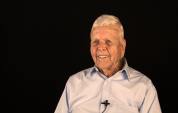4:39 | He had been a Radioman for the Navy and when Turner Harris was called to active duty during the Korean War, they sent him to Adak, Alaska, where he monitored Russian Morse Code for Communications Support Activities, a Naval signal intelligence agency. He missed his wife, but the chow was good.
Keywords : Turner Harris Macon GA Bainbridge Island WA Communications Support Activities (CSA) Morse Code Russia typewriter Adak AK Browning Automatic Rifle (BAR) Arctic reserve

He decided he would rather ride than walk, so Turner Harris volunteered for the Navy in 1942. His journey started out rough in an open rail car with cinders blowing on him. After basic training, he was sent to radio school and eventually assigned to the USS New Orleans, a heavy cruiser.
Turner Harris joined the crew of the USS New Orleans just as repairs were completed. The Radioman was assigned to Radio Room 3, deep in the ship. His first action was off Wake Island, where he felt, but could not see, the artillery fire from shore. After the battle, he asked his Chief for a big favor.
The MPM Circuit was a continuous feed from Honolulu, one coded message after another, 24 hours a day. Radioman Turner Harris translated the Morse code for the decoding officer, then was on to the next message. That was also his battle station so he spent a lot of time there. He was on a heavy cruiser that was bombarding Japanese held islands.
Two planes roared right across the bow of the ship. "Those are Jap planes," said Turner Harris, and he watched one of the kamikazes damage two aircraft carriers. At the Battle of Okinawa, his ship bombarded the island for 59 days, all the while fighting off Japanese attacks with anti-aircraft fire and smokescreens.
It became known as the Turkey Shoot because of the incredible numbers of downed Japanese planes. That was the Battle of the Philippine Sea and the next battle, Leyte Gulf, broke the back of the Japanese in the South Pacific. Radioman Turner Harris credits the American Hellcat pilots with his survival in those battles.
Turner Harris went through three typhoons during his Pacific tour. The first two didn't amount to much, but the third one was deadly. He describes the sight of the giant swells and how he avoided injury, at least until he went to fetch sandwiches.
Turner Harris had to go to the head but there was a long line, so he sat down for a moment on a ladder at the edge of the ship. He heard a plane in distress and turned to watch it hit one of the masts and explode. The next thing he knew, he was over the edge and hanging on for dear life.
Finally back home, Turner Harris could not find a job, so he reenlisted and became a Navy recruiter. After a while, he took a civilian job, but the Navy lured him back in with clandestine work, although he didn't realize that was what it was. He was working for Communications Support Activities, a Naval signal intelligence agency.